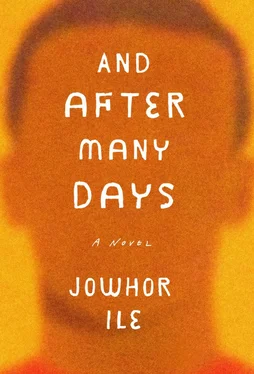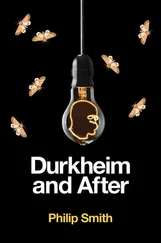Ma returned to the parlor, wiping her hand on a napkin, just as the final news recap came on at eleven. Government, the newsreader said, had gone into dialogue with the university students regarding their grievances. All citizens, the man continued, were being admonished to “give peace a chance, to refrain from violent, nefarious activities, and to engage in dialogue with government for the betterment of the state.”
The national anthem was played by a full military band. On the TV screen was a fluttering flag hoisted high: bands of rich green on either end of the flag and a white band in the middle with the coat of arms printed on it. The pledge was recited by a choir of unseen children, and then the station went off the air.
There was silence and intermittent bursts of conversation. All Ajie could think of was Auntie Julie weeping that afternoon as though Paul were dead; Bibi sitting for so long in the dining area until it was dark and she became one with the woolly shadows of the shelves. And now there was Bendic with a newspaper adrift in his lap, although he had put his glasses away. Auntie Julie shifted in her seat. She let out a deep sigh and leaned back in the sofa. For a moment she seemed to have dropped into sleep, and then the song came out of her in a low stream, as if from some secret speakers hidden beneath her seat. Her eyes were now closed.
The steadfast love of the Lord never ceaseth
His mercies never come to an eeeeeend…
Her voice glided over the high notes and her hands were held together in a tight ball, between her legs, on the slope of her gown. Bendic leaned back and watched. Bibi, Ma, Ajie, all sat as if uncertain of their position — should they join in or remain mere spectators? Were they being called on to take roles in this play they weren’t familiar with? Ajie felt his bladder fill up, and he knew he would have to get up and go to the bathroom. Auntie Julie leaned to one side as she rummaged through the pocket of the boubou, the song still coming out of her, and brought out a white hankie that she spread out over her head. She looked at Bibi in a way that perhaps should have persuaded Bibi to find a covering for her head as a woman in the posture of prayer, but Bibi sat there, her lips barely moving. The song was common enough, even for irregular churchgoers. Ma joined in. Ajie stood up, looked at Bendic as if asking to be excused, then pointed toward the bathroom. Auntie Julie made a smooth segue into a church chorus:
He can never never change
He can never never change
He can never never change
Jesus the same forever
He can never never change
In the bathroom, Ajie looked in the mirror and thought his face looked bigger than it really was. He heard Ma’s voice rise as the singing continued. They sang the same chorus over and over, in different languages — Kalabari, Igbo, Yoruba, Ogoni. Ma’s voice strained over the high notes, but she kept on, steady, pushing through by the sheer strength of her lungs. Her voice stood apart, raw and singular, like a howl in the forest. Ajie lifted the toilet lid and sat down. After the singing had died down, he stood up and flushed the toilet and then returned before the mirror to brush his teeth. He heard Auntie Julie say good night, and then the slow slap-slap of her rubber slippers as she walked past the bathroom door and down the corridor. He didn’t hear Bibi leaving the parlor, but he heard the sharp click of her door when it closed.
Bendic was talking to Ma now. Ma interrupted, her voice tense, impatient. “No mortuary, please, Ben. You can check hospitals. Emergency units.” He heard Ma snap her fingers. “God forbid — what are you thinking?” Bendic’s low voice kept saying something back to her.
Ajie bared his teeth before the mirror the way people did in toothpaste commercials. He picked up Paul’s toothbrush and ran his thumb over the bristles. Moist. He put it back in the cup. He then used his fingers to push the corners of his lips up as if to pull a smiley face. If something really bad is happening, Ajie thought, is it possible to try to smile, even if it is only a pretend smile? And if you are able to smile when “something really bad” is happening, does that count? Could that be a sign that things will turn around for good? He pushed the corners of his mouth upward. This time, three front teeth showed. He picked up Paul’s brush again and ran his thumb over the bristles but wasn’t sure anymore if the moisture was from the brush itself or just his own fingers.
—
Ajie awoke from a dream and looked across to Paul’s bed, and there he was, carelessly asleep, covered in a blanket. He was lying on his chest with his face down, his hands folded over the pillow. Then he turned onto his side, drew up his legs, and held the blanket close around his neck; he stretched out his long legs across the bed and threw a sleepy arm over his face. Now he was on his front, with his legs drawn up under him like someone attempting to crouch. Then he lay still for a while. A person under a blanket could sometimes look like a camel, a camel with its hump, or a pitched tent under a dark desert sky. Paul stirred. Then the inky edges of the blanket became vague and wavy, as if he weren’t there anymore. Outside, the moon moved and threw a light on the empty pillow. Ajie kept staring at the bed, willing Paul’s form back on it, but he couldn’t remember how Paul used to look while lying on his bed.
When Ajie got up in the morning, it was already bright, and he heard Ismaila’s voice carry through from the front of the house, where he washed the car. The singing ended. Ajie didn’t imagine that singing of any sort could occur when no one knew where Paul was.
Ma and Bendic didn’t leave early for work, as they used to. On the windowsill beside Paul’s bed (Paul had the window bed, since he was older), the blue beetle-shaped digital clock sat, its screen facing outside. What time was it? The forgotten dream came back to him. He was sitting with Auntie Julie by a well. She stood up to leave, then tripped over a bucket and fell into the well. He looked into the well and saw her head bobbing, water splashing around her. She wasn’t shouting or crying for help. She just bobbed up, down, up, down, kicking and splashing the water with her hands. As if it were all planned, Ajie lifted the lid and covered the well and hooked it shut with a piece of metal. Muffled echoes of his name began to come from below, like someone shouting into a pillow. As he walked away from the scene, he looked up, and there was Paul sitting high in a nearby tree, looking down at him with accusation in his eyes.
It annoyed Ajie, now that he was awake, that it didn’t occur to him to ask Paul where he had been those four days when everyone was looking for him.
—
Auntie Julie was getting ready to leave when Ajie walked into the parlor. She had changed into her own clothes and was holding a little bag in her hand. “You have woken up. Your sister is at the back of the house,” Auntie Julie said somberly, as if Bibi were just the right person for him to see now that he was out of bed.
His memory of Auntie Julie began with conflict. When he was either four or five, Auntie Julie came to visit one day, and while Ma and Bendic talked with another visitor in the parlor, Auntie Julie jostled the children into the kitchen to interrogate them about what she said was their complete lack of respect. She shut the door behind her and right away asked, “Why do you people call your father by his name?” At first no one moved to answer. She scanned their faces disapprovingly and then focused on Paul’s. “You cannot answer me?”
“Our father’s name is Benedict,” Bibi offered. “We, we call him Bendic, and—”
Читать дальше












